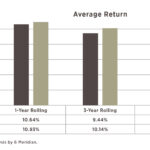Very few divorces are “easy.” When children are involved, the process becomes even more complicated. And for high-income couples and those with complex assets, such as real estate or privately held businesses, a divorce can drag on for many months or even years, at great expense to the couple involved.
The expression “choose your battles” may prove useful when weighing the costs and benefits, both financially and emotionally, of issues raised during a divorce, but settlements can also carry the weight of permanence: If something is missed and the divorce is finalized, going back and revising agreements can be more difficult and considerably more expensive than if the issue were addressed the first time around.
So how does one balance streamlining the process while avoiding unintentional consequences?
One of the first phone calls many people make after deciding to divorce is to attorneys, but involving a financial advisor from the very beginning of the process can also help you better pinpoint your priorities and negotiate for better outcomes. This is particularly the case for couples with more complex balance sheets. Advisors know all divorces are not the same, and they likely can make referrals to attorneys based on different circumstances.
Here are examples of the types of financial situations that merit a broader set of considerations and are likely best served through collaboration with a financial advisor, in addition to an attorney and possibly other advisors.
Complex Income Structures
Determining a financial settlement that includes splitting assets, alimony and child support, while certainly not easy from an emotional standpoint, can be fairly straightforward, in part because it is driven by standard formulas. Attorneys work with these formulas every day, know where wiggle room exists and have a good sense of where a judge might push back.
However, the situation is different when one of the spouses has a more complex compensation structure, which is often the case for business owners and corporate executives. This could include some or all of the following:
- Base salary
- Cash bonus
- Stock incentives
- Stock options
- Deferred compensation
- Retirement plan contribution matches
- Income from complex trusts
Simply following formulas in this case may be a very unbalanced approach. It can be helpful to involve a financial advisor who understands these types of compensation arrangements and can model income projections and suggest a settlement fair to both parties.
One additional consideration: For some high-net-worth couples, the formulas may become less prescriptive, especially if one spouse is working with an attorney particularly skilled in pushing for alimony or spousal support beyond the traditional guidelines. It’s important to know the type of lawyer your ex-spouse has and to prepare adequately.
Private Investments
Private investments, unlike stocks, bonds, mutual funds and other popular investment types, are assets that aren’t sold to the public. Common examples include:
- One-off investments with friends or family
- Private equity
- Hedge funds
- Residential or commercial real estate
Often these investments are difficult to value, and one party could pay the cost if they’re valued incorrectly. They can also be difficult to divide, requiring more complex discussions around who takes what and what the other individual gives up in return. In addition, these assets may make you vulnerable to asymmetric information. One spouse may have a better sense of an accurate valuation and could therefore exaggerate or underestimate the investment’s fair value to benefit the outcome on their behalf.
Sometimes spouses think they can simply transfer their valuable assets to a third party, such as a business partner or child from a former marriage, to shield them from the divorce settlement. These kinds of transfers can be seen as fraudulent, thus impacting one of the most important factors in a courtroom — trust and credibility.
Compiling an initial list of the investments you believe exist is a good starting point to discuss with your attorney and financial advisor. If you believe your partner could be hiding assets, you may need help from specialized professionals, such as a forensic accountant or business evaluator. Your attorney and financial advisor can help refer you to experts and can collaborate as a team to help you find and value any undisclosed assets.
Business Owners
Spouses who own businesses need specialized support. A non-owner spouse is at a disadvantage because it’s unlikely they could properly value the current and future prospects of the business, and the business-owning spouse is naturally incentivized to undervalue the company. In many instances, an independent appraisal is needed.
Not all businesses are created equal. For instance, how does one determine the value of a consulting business with no assets other than the owner’s contacts and relationships? The business owner may claim it’s of no value to the spouse, but that’s a difficult argument to make if the business has been generating income on which the family depends. Valuing such a business might take into consideration long-term contracts, past revenues and a myriad of other factors.
Once a fair valuation is ascertained, what to do next also may prove challenging. Simply splitting the business down the middle, with the owner paying out half the value, may not be feasible if doing so will cripple the ongoing success of that business. It’s also rarely advisable for ex-spouses to continue to act as co-owners of the business, as there are too many chances to act in bad faith and hurt the business.
Retirement Accounts
Because of tax implications, splitting retirement accounts isn’t as simple as adding up the totals and dividing in half. In some cases, couples choose to use retirement accounts as an offset for another asset — for example, by having one individual keep the retirement account in exchange for forfeiting a share of the family home.
When retirement accounts are split, it is done by a qualified domestic relations order (QDRO), which involves evaluating and splitting the assets and then transferring a portion to the other party’s retirement account without triggering tax consequences.
Oftentimes, fully transitioning retirement assets split by QDRO to the other spouse’s name takes a significant amount of time. During this time, the market is still open and trading daily. If the language of the QDRO does not incorporate market return, one spouse could leave a lot of money on the table.
In dealing with QDROs, the goal should be to resolve the QDRO during the court process while everyone is motivated to work together for an overall resolution. The QDRO submission process becomes more complex as time goes by with various changes that may occur and impact beneficiaries and survivor benefits, such as market gains/losses, employment changes and unexpected life changes (e.g., death or remarriage).
Lastly, if you take a retirement asset and your partner takes a taxable asset, you have to account for taxes and liquidity. A retirement account is generally not liquid unless you are age 59 ½ or older and can avoid the 10% penalty for early withdrawals. Even then, every dollar withdrawn from a retirement account (unless it is a Roth vehicle) is taxed as earned income.
Any potential resolution to these issues also has tax considerations. Both of your tax brackets may change, shifting the net results. Alimony is also taxed, while child support isn’t. These are good conversations to have with a financial advisor — one who understands all the emotional and financial considerations involved in these important decisions.
Additional Financial Hurdles
Keeping the Primary Home
Often, one spouse may want to stay in their pre-divorce home, particularly if they have children, to avoid upheaval and exacerbating an already-chaotic situation. As we’ve mentioned, a greater share of the family home can be used to offset one’s stake in a retirement account, or the spouse who retains the house could also take on additional financial responsibilities, such as paying children’s college tuition.
However, it’s important to consider that the home may be more expensive than one can afford on their own, which can cause a cash strain. This, in turn, can lead to bad long-term financial decision-making. For instance, the homeowner may need to dip into retirement savings, incurring tax liabilities or even early-withdrawal penalties. Beyond affordability issues, the home may not have the potential to appreciate as much as other investments the homeowner could make, leading to less money for retirement and other life goals.
Health Care
In most cases, one spouse will need new health care coverage after separating or divorcing (in some cases, separated couples can stay on one health care plan) because they will fall off the other’s policy. Premiums and prescription costs can be shockingly expensive, especially if you lose access to employer-sponsored insurance as a result of the divorce. In some instances when children are involved, out-of-pocket expenses are still split, requiring formal agreements ahead of time.
Capital Losses on Tax Returns
This provision — an often overlooked hidden gem from prior tax returns ― allows whomever retains the rights, per the divorce agreement, to offset future gains with unused capital losses.
Here’s an example:
- A couple realizes $200,000 in capital losses from selling investments during a single year.
- In 2023, the couple’s investment accounts realize a $300,000 capital gain.
- The spouse who keeps the loss will pay taxes on only $100,000 of this gain.
- If the loss is not retained and used to offset the gain, the couple will owe capital gains taxes on the full $300,000 gain, leaving less money for both.
The Importance of a Plan
All of these scenarios are examples of financial variables that risk further complicating the divorce process and highlight the importance of working with a financial advisor as part of your divorce team.
In addition to being able to guide you through this process, a financial advisor can help you with what we believe is the most powerful tool walking into negotiations: a plan.
What are your goals during this next phase of your journey? What do you believe will fulfill you the most? A new home in a different location? More time with your children? Being able to pay for their college and help them out when they graduate? Do you want to travel more? Do you have charitable intentions?
Sitting back and reflecting on these life goals can help you and your advisor estimate how much money you need and under what structure and timeline. And it will provide a foundation to refer back to as you negotiate; when you’ve set your priorities you will be better positioned to know where to give and take — and you can do so with less emotion. Your priorities, rather than the money itself, will serve as a “business plan” to guide your decisions.
If you or someone you know needs help building such a plan and navigating the financial complexities of divorce, please reach out to us. We have had the privilege of helping many people come through this difficult period with renewed purpose and the right financial plan to back it.



